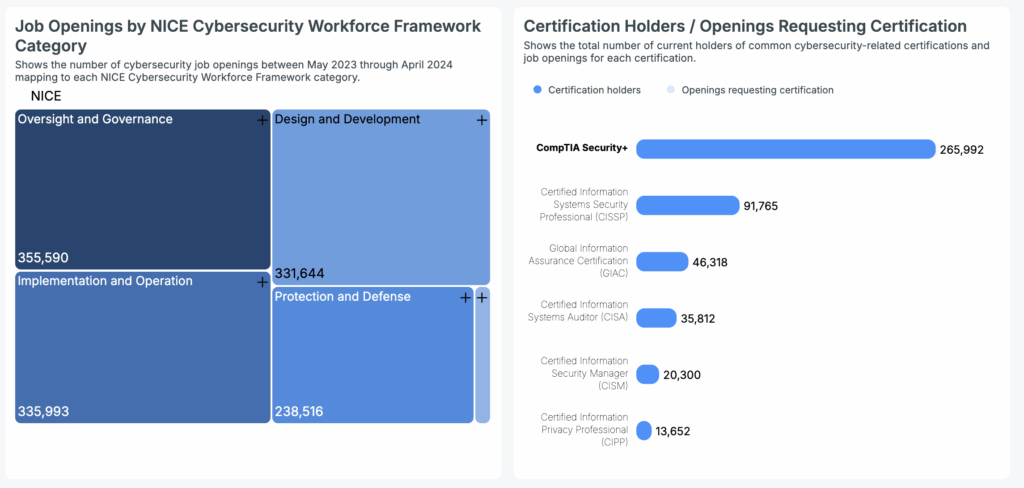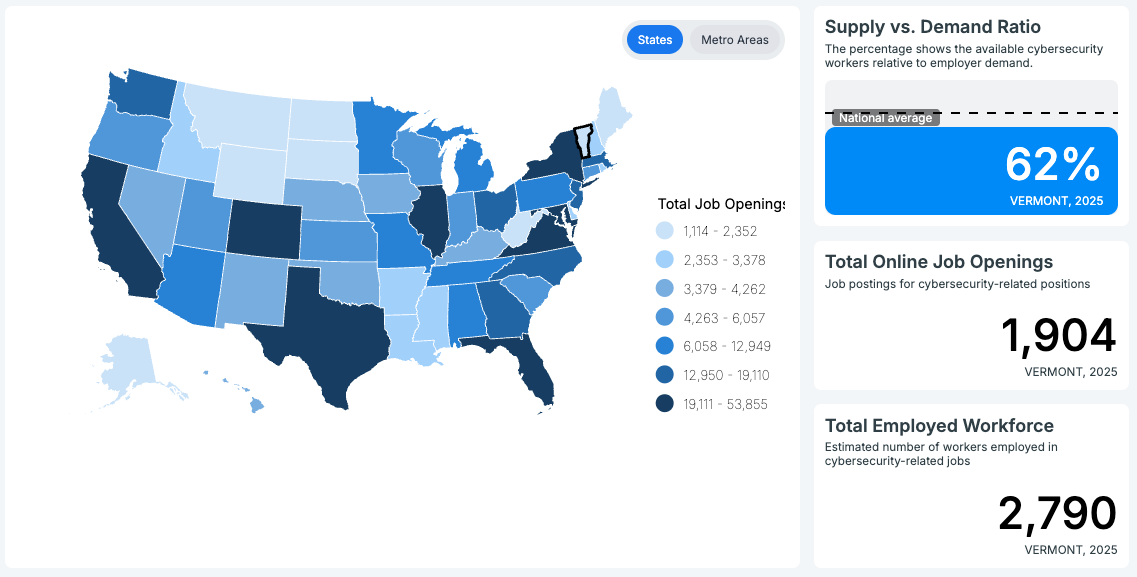- Associate degrees
- Bachelor’s degrees
- Master’s degrees
- Cybersecurity certifications
- Cybersecurity jobs
- Cybersecurity degree programs
This guide is about cybersecurity schools in Vermont. It also includes information about the economic conditions in Vermont.
Across its industries, its investments in software development and information technology include a diverse selection of businesses that deliver software, including IBM, one of the largest technology companies in the United States.
Ad
cybersecurityguide.org is an advertising-supported site. Clicking in this box will show you programs related to your search from schools that compensate us. This compensation does not influence our school rankings, resource guides, or other information published on this site.
Featured Cybersecurity Degree Programs
| School Name | Program | More Info |
|---|---|---|
| Southern New Hampshire University | Online BS in Cybersecurity or Online MS in Cybersecurity | website |
| Syracuse University | Online MS in Cybersecurity | Complete in 15 Months | website |
| Pace University | Online MS in Cybersecurity | website |
| Purdue Global | Online BS in Cybersecurity | website |
| UC Berkeley School of Information | Master’s in Cybersecurity | No GRE/GMAT Required | website |
Vermont data analysts predict that tech sector jobs will continue to grow at a rate of 7.5 percent. As of 2014, Vermont tech workers generate an estimated $5.6 billion in annual wages, earning more than 63 percent of the state average, according to Vermont’s tourism website.
The Agency of Commerce and Community Development consistently invests in new industries to attract businesses and continue their expansion, despite the state’s business costs at 12 percent.
Since 2018, the state has advanced educational opportunities in high-growth fields such as manufacturing, construction, and cybersecurity, focusing on reforming high schools and universities to create career pathways for students.
As one of the few states to develop a comprehensive economic development strategy, Vermont’s investments in cybersecurity have cultivated rapidly, generating new options for job engagement and economic growth.
Related resources
Growing awareness of cybersecurity in Vermont
As part of the state’s comprehensive economic development strategy, Vermont’s significant initiatives highlight an artificial intelligence task force as a critical component for its defense against digital security breaches. Its task force will research the field of artificial intelligence and how it can responsibly grow Vermont’s technology sectors.
According to the state’s Office of Economic Adjustment Defense Industry, Vermont received a joint grant of $1.5 million alongside states such as Connecticut, Massachusetts, New Hampshire, Maine, and Rhode Island.
As part of its diversification programs, the state, in collaboration, will create the New England Regional Defense Industry Collaboration to defend against cybersecurity attacks, grow defense-related businesses to meet the new cybersecurity requirements and production goals.
Among the state’s major initiatives, Vermont’s expansion in education includes its collaboration with Norwich University to create a Cybersecurity Operations Center.
The center will educate students on cybersecurity methods to defend against the millions of digital attacks the state faces each year, serving as real-world training for future jobs, including federal positions at the Department of Defense.
Governor Phil Scott also partnered with the SANS Institute to implement the Girls Go CyberStart challenge for high school students to develop cybersecurity skills and career exploration opportunities.
Alongside emphasizing its initiatives on student engagement, the state’s Agency of Commerce & Community Development awarded $325,000 from the Vermont Training Program (VTP) and the Vermont Employment Growth Incentive (VEGI) program to NuHarbor Security to provide online learning and hands-on training to its employees.
Cybersecurity education in Vermont
Vermont provides numerous academic opportunities through the Agency of Education, working with career and technical centers to develop cybersecurity career pathways for high school and college students.
Teachers from specialized centers and universities regularly attend professional development activities to prepare them for Vermont’s Career Pathway in Cybersecurity program.
“Starting these initiatives now is particularly important because it will help reduce the impact of retirements across the advanced manufacturing industry in Vermont,” said Governor Scott.
“In addition, cybersecurity is one of the fastest-growing sectors in the country and world. By developing a K-16 cybersecurity career pipeline, we have the opportunity to develop and attract high-paying tech sector jobs through a skilled, in-demand workforce,”
Cybersecurity associate degrees in Vermont
An associate degree in cybersecurity in Vermont is crucial as it provides a stepping stone for students to enter one of the fastest-growing sectors in the country, equipping them with essential skills in networking, programming, and system security.
The state’s investment in cybersecurity education reflects its commitment to developing a skilled workforce that can protect against digital security breaches and support the local economy.
With tech sector jobs in Vermont predicted to grow significantly, an associate degree in cybersecurity offers graduates a competitive edge in the job market and a pathway to high-paying careers in a field that is becoming increasingly vital to the state’s infrastructure and business community.
Cybersecurity bachelor’s degrees in Vermont
Norwich University supplies students with innovative options for beginning and furthering their education in computer science, information technology, and cybersecurity.
The university offers a Bachelor of Science in Cybersecurity, also known as its Computer Security and Information Assurance degree, to students aspiring to achieve a well-rounded degree in the information technology sector.
Students intending to pursue Norwich’s cybersecurity degree will apply fundamental practices of digital forensics, information assurance, and digital incident investigation, understand cyber law and cybercrime, and use programming languages to solve problems related to network defense. The bachelor’s degree program provides online courses.
Champlain College offers one program at the bachelor’s degree level, and it focuses on a Bachelor of Science in Computer Networking & Cybersecurity. This program is designated the Center of Academic Excellence in Cyberdefense Education by the National Security Agency (NSA) and the Department of Homeland Security (DHS).
Cybersecurity master’s degrees in Vermont
At Norwich University, students wishing to advance their careers in the theoretical fundamentals of cybersecurity can pursue an online master’s degree in cybersecurity.
The master’s program develops management skills related to computer assets, incident response, and forensic investigation, and will apply those skills in a complex business enterprise. The degree program also provides options for concentrations, such as project management, vulnerability assessments, cyber law, and forensic investigation.
Cybersecurity certifications in Vermont
Analyzing Cyberseek’s nationwide data reveals the distribution of professionals holding key cybersecurity certifications. The current figures are as follows:
- CompTIA Security+: 265,992 certification holders
- CISSP: 91,765 certification holders
- GIAC: 46,318 certification holders
- CISA: 35,812 certification holders
- CISM: 20,300 certification holders
- CIPP: 13,652 certification holders

Among the variety of degree programs, there is only one certificate program for students looking to add to their careers in cybersecurity and information systems.
Champlain College provides students with an undergraduate certificate in cybersecurity fundamentals.
Cybersecurity jobs in Vermont
Looking for where the cybersecurity opportunities are in the U.S.? From May 2023 to April 2024, the nationwide demand was clear.
Roles in Oversight and Governance presented the most openings (355,590), while Implementation and Operation (335,993) and Design and Development (331,644) also offered vast possibilities. You’d also find significant roles in Protection and Defense (238,516) and Investigation (19,525).
With a total of 2,790 job openings in Vermont, around 1,904 employees currently work in the cybersecurity field, according to Cyberseek.

The Bureau of Labor Statistics also reported that security analysts earned an average hourly wage of $41.73, which equated to an annual salary of $86,810 on average.
Cybersecurity in Vermont
Vermont continues to expand its technology sector by investing in educational incentives, encouraging colleges to provide a vast array of cybersecurity degree programs for future students.
Cybersecurity in the state continues to be an ever-expanding prospect to bring in corporate enterprises, generate gross domestic income, and improve the lives of Vermont’s citizens through digital security measures and improved software development.
Cybersecurity degree programs in Vermont
- Program: Bachelor of Science in Cyber Security
CAE designation: CAE-CD
Credits: 120
Cost per credit: $375
Delivery Method: Online
Learn more: Program details - Program: Bachelor of Science in Computer Networking & Cybersecurity
CAE designation: CAE-CD
Credits: 120
Cost per credit: $1,503
Delivery Method: Campus
Learn more: Program details - Program: Master of Science in Cybersecurity
CAE designation: CAE-CD
Credits: 36
Cost per credit: $799
Delivery Method: Online
GRE/GMAT Required: Not Required
Learn more: Program details - Program: Online Undergraduate Certificate in Cybersecurity Fundamentals
CAE designation: CAE-CD
Credits: 18
Cost per credit: $335
Delivery Method: Online
Learn more: Program details